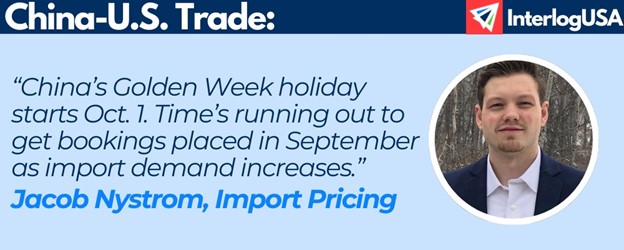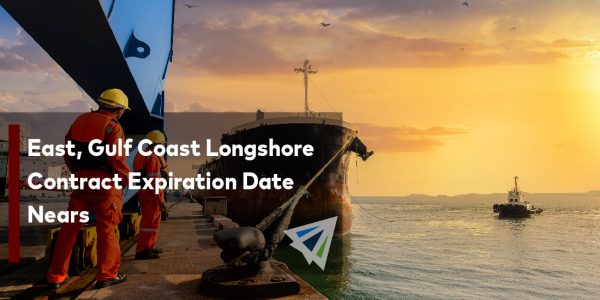Competitive Edge
September 18th, 2024
Stay Current with InterlogUSA
Latest Industry Happenings and Market Updates:
Across International Shipping: News and Developments
[Labor] U.S. Longshore Negotiations: According to sources close to the talks, three issues have contributed to the lack of progress in contract negotiations: automation; wages; and pensions.
The longshore union, representing some 45,000 dockworkers across U.S. East and Gulf coast ports, has vowed to strike on Oct. 1 if a favorable proposal is not offered by maritime employers before the existing contract’s expiration date (Sep. 30).
For the latest chronicle on the U.S. longshore contract cycle, refer to our August issue of Interlog Insights!
[International Holiday] China’s Golden Week Starts Oct. 1: One of China’s main celebratory periods will begin in less than two weeks. China’s annual Golden Week will start Oct. 1 and conclude Oct. 7. During this week-long stretch, millions of Chinese citizens will take off work, including those in the transportation and manufacturing industries. Unless advised otherwise, all major ports and inland depots will be operationally limited, while factories, warehouses, or other relevant businesses will temporarily close.
A “pre-holiday rush” occurs in the weeks leading up to Golden Week, an acceleration in demand which elevates freight rates and tightens space. The impacts of this holiday are regularly expected, but nonetheless can lead to shipping delays and added costs for unprepared U.S. importers.
URGENT BOOKING: If you have ready orders that need to be brought in before Golden Week, InterlogUSA has options available for last-minute bookings. Contact us to see if they work for you.
[Weather] Storm Shuts Down U.S.-MEX Crossing: Over the weekend, the World Trade Bridge in Laredo, Texas was temporarily closed following a severe storm Saturday night. The border crossing reopened Monday.
The brief closure still posed freight delays, including for U.S. imports coming through Mexico. The World Trade Bridge is the busiest commercial crossing between the U.S. and Mexico.
[Air Freight] Executives Anticipate ‘Historic Peak Season’: Air carrier executives foretell of a record-breaking performance for peak season freight volumes in 2024. With the industry already subjected to flourishing e-commerce demand, executives who spoke to the Journal of Commerce explained that a seasonal surge in online shopping will double down on this growing business to cap out the year.
IMPORT: Asia to North America (Transpacific Eastbound)
Rates: Rates to all U.S. coasts have softened. Carrier-imposed rate increases are still a possibility through early fall.
Space: There is typically a tightening in space through late September as U.S. importers book orders prior to China’s Golden Week holiday.
Capacity: Continued routings around Africa as well as port congestion in Asia have led to more instances of blank sailings.
TIPS:
- Hold your logistics partners accountable for frequent updates regarding current market conditions.
IMPORT: Europe to North America (Transatlantic Westbound)
Rates: Rates have fallen since early summer. Ocean carriers did not implement GRIs Sep. 1.
Space: Space is open.
Labor: A potential longshore strike at East Coast ports in October is a primary concern for transatlantic trade.
TIPS:
- Book at least two weeks prior to the ready date.
- If feasible within your timeline, place inbound bookings in September to avoid disruptions if there is a dockworker strike in the fall.
EXPORT: North America to Asia
Harvest Season: Agriculture exports are picking up at North America’s West Coast ports as North America’s harvest season is underway.
Rates: Rates are strengthening.
Freight News
Gemini Cooperation Revises Their Network Schedule, New Updates
Biden Administration Finalizes China Tariffs
Several ports in Asia are expected to regain direct calls on several services in the Gemini Cooperation’s service network. Per a statement from Hapag-Lloyd — soon to be a partner in the new alliance – in October, they will announce their network selection for operators: either the Suez or Cape Network.
The carriers (Hapag-Lloyd and Maersk) both note, in separate statements, that the Suez Network would transit through the Red Sea, while the Cape Network would go around the Cape of Good Hope as an alternative of passing through the Red Sea – due to the various disruptions happening in that channel.
According to the Journal of Commerce, the Suez Network would have 27 mainline and 30 shuttle services with a total of 300 ships at 3.4 million TEUs on trade lanes covering Asia-U.S., Asia-North Europe, Asia-Mediterranean, Asia-Middle East, Middle East-India, Europe, and the Trans-Atlantic.
Furthermore, on the Cape Network, they would have 29 mainline and 30 shuttle services with a total of 341 ships at 3.7 million TEUs on the same seven trade lanes as mentioned above, the JOC reports.
Depending on which network option is selected – either the Suez Network or the Cape Network –users will enjoy 57-59 services, plus a fleet of 300-340 vessels.
At the end of July, the U.S. Trade Representative (USTR) paused the initiation of tariff increases to be able to review the over 1,000 public comments of the proposed modifications. This comes after the USTR unveiled plans in May to boost Section 301 tariff rates on certain goods from China.
Some of tariff increases, as detailed in USTR’s Federal Register Notice, include:
- Battery parts (non-lithium-ion batteries) – an increase of 25% in 2024.
- Electric vehicles – an increase rate to 100% in 2024.
- Medical gloves – an increase to no less than 25% in 2026.
- Permanent magnets – an increase of 25% in 2026.
- Semiconductors – an increase of 50% in 2025.
- Ship-to-shore cranes – an increase of 25% in 2024. (Note: One caveat is this allows for exclusions for cranes ordered before May 14th, 2024, and that enter the country before May 14th, 2026).
- Steel and aluminum products – an increase of 25% in 2024.
The increase of these tariffs is the Biden Administration’s attempt to improve the U.S.’ competitive standing in the clean energy and technology industry, Supply Chain Dive reports.
Along with Maersk, which ocean carrier is other half of next year's Gemini Cooperation Alliance?
Answer: C – Hapag-Lloyd
Johnny Cargo sure knows a lot! Other than fun facts, Johnny also can provide insight into InterlogUSA’s many service and pricing options. He is always available for a quick conversation.
Click HERE to chat with Johnny Cargo.

Sign up for our
industry answers
Our team works to provide valuable, unique, and relevant content to assist you in finding solutions. Sign up now.


